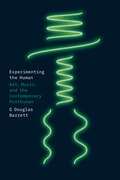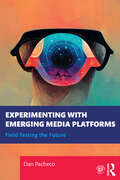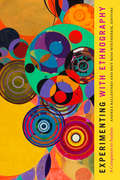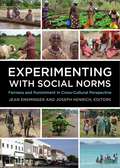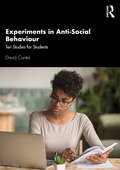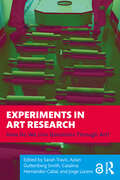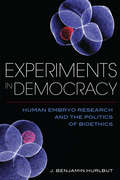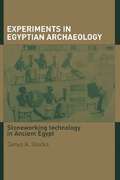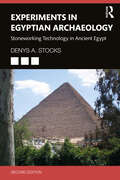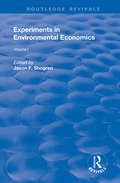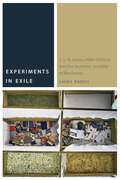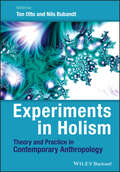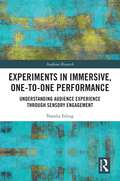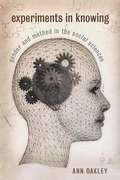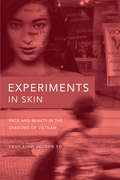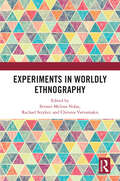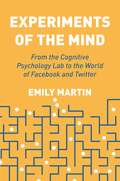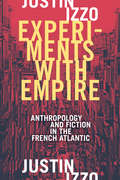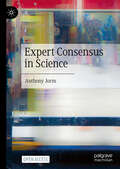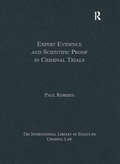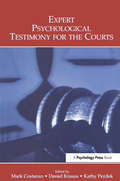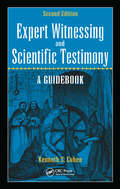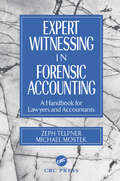- Table View
- List View
Experimenting the Human: Art, Music, and the Contemporary Posthuman
by G Douglas BarrettAn engaging argument about what experimental music can tell us about being human. In Experimenting the Human, G Douglas Barrett argues that experimental music speaks to the contemporary posthuman, a condition in which science and technology decenter human agency amid the uneven temporality of postwar global capitalism. Time moves forward for some during this period, while it seems to stand still or even move backward for others. Some say we’re already posthuman, while others endure the extended consequences of never having been considered fully human in the first place. Experimental music reflects on this state, Barrett contends, through its interdisciplinary involvements in postwar science, technology, and art movements. Rather than pursuing the human's beyond, experimental music addresses the social and technological conditions that support such a pursuit. Barrett locates this tendency of experimentalism throughout its historical entanglements with cybernetics, and in his intimate analysis of Alvin Lucier’s neurofeedback music, Pamela Z’s BodySynth performances, Nam June Paik’s musical robotics, Pauline Oliveros’s experiments with radio astronomy, and work by Laetitia Sonami, Yasunao Tone, and Jerry Hunt. Through a unique meeting of music studies, media theory, and art history, Experimenting the Human provides fresh insights into what it means to be human.
Experimenting the Human: Art, Music, and the Contemporary Posthuman
by G Douglas BarrettAn engaging argument about what experimental music can tell us about being human. In Experimenting the Human, G Douglas Barrett argues that experimental music speaks to the contemporary posthuman, a condition in which science and technology decenter human agency amid the uneven temporality of postwar global capitalism. Time moves forward for some during this period, while it seems to stand still or even move backward for others. Some say we’re already posthuman, while others endure the extended consequences of never having been considered fully human in the first place. Experimental music reflects on this state, Barrett contends, through its interdisciplinary involvements in postwar science, technology, and art movements. Rather than pursuing the human's beyond, experimental music addresses the social and technological conditions that support such a pursuit. Barrett locates this tendency of experimentalism throughout its historical entanglements with cybernetics, and in his intimate analysis of Alvin Lucier’s neurofeedback music, Pamela Z’s BodySynth performances, Nam June Paik’s musical robotics, Pauline Oliveros’s experiments with radio astronomy, and work by Laetitia Sonami, Yasunao Tone, and Jerry Hunt. Through a unique meeting of music studies, media theory, and art history, Experimenting the Human provides fresh insights into what it means to be human.
Experimenting the Human: Art, Music, and the Contemporary Posthuman
by G Douglas BarrettAn engaging argument about what experimental music can tell us about being human. In Experimenting the Human, G Douglas Barrett argues that experimental music speaks to the contemporary posthuman, a condition in which science and technology decenter human agency amid the uneven temporality of postwar global capitalism. Time moves forward for some during this period, while it seems to stand still or even move backward for others. Some say we’re already posthuman, while others endure the extended consequences of never having been considered fully human in the first place. Experimental music reflects on this state, Barrett contends, through its interdisciplinary involvements in postwar science, technology, and art movements. Rather than pursuing the human's beyond, experimental music addresses the social and technological conditions that support such a pursuit. Barrett locates this tendency of experimentalism throughout its historical entanglements with cybernetics, and in his intimate analysis of Alvin Lucier’s neurofeedback music, Pamela Z’s BodySynth performances, Nam June Paik’s musical robotics, Pauline Oliveros’s experiments with radio astronomy, and work by Laetitia Sonami, Yasunao Tone, and Jerry Hunt. Through a unique meeting of music studies, media theory, and art history, Experimenting the Human provides fresh insights into what it means to be human.
Experimenting with Emerging Media Platforms: Field Testing the Future
by Dan PachecoExperimenting with Emerging Media Platforms teaches students in media tracks – journalism, advertising, film, and public relations – how to independently field test and evaluate emerging technologies that could impact how media is produced, consumed, and monetized in the future. Taking a unique trial-and-error approach, the author encourages students to go against their desire for perfection and instead plunge into exercises with the full expectation that they will "fail" many times before they succeed. Through focused assignments, this book provides pointers on how to familiarize oneself with current technology, including extended reality (XR, VR, AR, and MR), open-source coding, photogrammetry, aerial imagery using drones, automation, and artificial intelligence. Readers are invited to create and test their own hypotheses and work outside of their comfort zones to reach conclusions on how a technology could enhance storytelling for a particular audience. Through experimentation guided by workbook exercises, case studies from students and media practitioners, practical tips, and reminders about ethical decision-making, students will learn how to work like explorers and civic hackers to enact change in the media landscape. Readers are invited to share their final field test results online through the book's companion website and social media channels, where the author will post links to further reading, coding templates for simple projects, and short video tutorials. Built around an established course being taught by the author and informed by over 20 years’ experience in media industries, Experimenting with Emerging Media Platforms is essential reading for aspiring media professionals and students undertaking courses such as Emerging Media, Media Innovation, and Media Startups. For additional resources, please see the companion website: www.emergingmediaplatforms.com.
Experimenting with Ethnography: A Companion to Analysis (Experimental Futures)
by Andrea Ballestero and Brit Ross WinthereikExperimenting with Ethnography collects twenty-one essays that open new paths for doing ethnographic analysis. The contributors—who come from a variety of intellectual and methodological traditions—enliven analysis by refusing to take it as an abstract, disembodied exercise. Rather, they frame it as a concrete mode of action and a creative practice. Encompassing topics ranging from language and the body to technology and modes of collaboration, the essays invite readers to focus on the imaginative work that needs to be performed prior to completing an argument. Whether exchanging objects, showing how to use drawn images as a way to analyze data, or working with smartphones, sound recordings, and social media as analytic devices, the contributors explore the deliberate processes for pursuing experimental thinking through ethnography. Practical and broad in theoretical scope, Experimenting with Ethnography is an indispensable companion for all ethnographers.Contributors. Patricia Alvarez Astacio, Andrea Ballestero, Ivan da Costa Marques, Steffen Dalsgaard, Endre Dányi, Marisol de la Cadena, Marianne de Laet, Carolina Domínguez Guzmán, Rachel Douglas-Jones, Clément Dréano, Joseph Dumit, Melanie Ford Lemus, Elaine Gan, Oliver Human, Alberto Corsín Jiménez, Graham M. Jones, Trine Mygind Korsby, Justine Laurent, James Maguire, George E. Marcus, Annemarie Mol, Sarah Pink, Els Roding, Markus Rudolfi, Ulrike Scholtes, Anthony Stavrianakis, Lucy Suchman, Katie Ulrich, Helen Verran, Else Vogel, Antonia Walford, Karen Waltorp, Laura Watts, Brit Ross Winthereik
Experimenting with Social Norms: Fairness and Punishment in Cross-Cultural Perspective
by Joseph Henrich Jean EnsmingerQuestions about the origins of human cooperation have long puzzled and divided scientists. Social norms that foster fair-minded behavior, altruism and collective action undergird the foundations of large-scale human societies, but we know little about how these norms develop or spread, or why the intensity and breadth of human cooperation varies among different populations. What is the connection between social norms that encourage fair dealing and economic growth? How are these social norms related to the emergence of centralized institutions? Informed by a pioneering set of cross-cultural data, Experimenting with Social Norms advances our understanding of the evolution of human cooperation and the expansion of complex societies. Editors Jean Ensminger and Joseph Henrich present evidence from an exciting collaboration between anthropologists and economists. Using experimental economics games, researchers examined levels of fairness, cooperation, and norms for punishing those who violate expectations of equality across a diverse swath of societies, from hunter-gatherers in Tanzania to a small town in rural Missouri. These experiments tested individuals’ willingness to conduct mutually beneficial transactions with strangers that reap rewards only at the expense of taking a risk on the cooperation of others. The results show a robust relationship between exposure to market economies and social norms that benefit the group over narrow economic self-interest. Levels of fairness and generosity are generally higher among individuals in communities with more integrated markets. Religion also plays a powerful role. Individuals practicing either Islam or Christianity exhibited a stronger sense of fairness, possibly because religions with high moralizing deities, equipped with ample powers to reward and punish, encourage greater prosociality. The size of the settlement also had an impact. People in larger communities were more willing to punish unfairness compared to those in smaller societies. Taken together, the volume supports the hypothesis that social norms evolved over thousands of years to allow strangers in more complex and large settlements to coexist, trade and prosper. Innovative and ambitious, Experimenting with Social Norms synthesizes an unprecedented analysis of social behavior from an immense range of human societies. The fifteen case studies analyzed in this volume, which include field experiments in Africa, South America, New Guinea, Siberia and the United States, are available for free download on the Foundation’s website:www.russellsage.org.
Experiments in Anti-Social Behaviour: Ten Studies for Students
by David CanterFor a practical, hands-on approach to learning forensic psychology, Experiments in Anti-Social Behaviour: Ten Studies for Students presents a collection of unique projects for students that illustrate the many ways research into anti-social behaviour can be conducted whilst also highlighting social psychological aspects of criminality. Drawing on over half a century of supervising many hundreds of projects at high school, undergraduate, masters, and doctoral levels, David Canter provides well-grounded and detailed guidance for students on how to execute a range of different research studies through several psychological approaches, including quantitative cognitive studies, qualitative discourse analysis, and social identity theory. After introducing the ethical and practical challenges of studying crime and criminality, Experiments in Anti-Social Behaviour outlines broad approaches to research. This is followed by ten practical studies for students to carry out in order to engage directly with experimental research. These studies cover experiments, surveys, and case studies, and include a controlled examination of how easy it is to forge a signature, descriptions of experiments trying to detect deception, and an exploration of what is involved in linking actions in a serial killer’s crimes to his characteristics. Both engaging and interactive, Experiments in Anti-Social Behaviour is an invaluable resource for instructors and students from colleges and universities around the world in many different fields, such as psychology, criminology, and socio-legal studies. It will also be of interest to all those who want to know more about the psychology of crime and criminality.
Experiments in Art Research: How Do We Live Questions Through Art?
by Sarah Travis Jorge Lucero Azlan Guttenberg Smith Catalina Hernández-CabalExperiments in Art Research: How Do We Live Questions Through Art? is not a conventional research methods guide; it's an encounter for asking questions through art.Originating from the work of a community of tightly connected scholars, artists, and teachers, the book unfolds through a tapestry of moments, practices, and people, embracing the celebration of works in progress and in community. Rooted in the practice of permission-giving, the narrative intertwines personal stories—laying bare the transformative power of unconventional teaching methods, risky endeavors, and the breaking of scholarly norms—and begins by understanding that “art” and “research” are not separate. After that, there are endless directions to take up. Instead of a handbook offering rules or best practices, this text offers an inspiring collection of joy, longing, and determination.This is fascinating reading for arts-based researchers, artists, educators in the arts, education scholars, research-creators, performance theorists, art history scholars, art education scholars, inter- and anti-disciplinary scholars, qualitative and post-qualitative researchers, decolonization scholars, public humanities scholars, and writing pedagogy scholars.
Experiments in Democracy: Human Embryo Research and the Politics of Bioethics
by J. Benjamin HurlbutHuman embryo research touches upon strongly felt moral convictions, and it raises such deep questions about the promise and perils of scientific progress that debate over its development has become a moral and political imperative. From in vitro fertilization to embryonic stem cell research, cloning, and gene editing, Americans have repeatedly struggled with how to define the moral status of the human embryo, whether to limit its experimental uses, and how to contend with sharply divided public moral perspectives on governing science.Experiments in Democracy presents a history of American debates over human embryo research from the late 1960s to the present, exploring their crucial role in shaping norms, practices, and institutions of deliberation governing the ethical challenges of modern bioscience. J. Benjamin Hurlbut details how scientists, bioethicists, policymakers, and other public figures have attempted to answer a question of great consequence: how should the public reason about aspects of science and technology that effect fundamental dimensions of human life? Through a study of one of the most significant science policy controversies in the history of the United States, Experiments in Democracy paints a portrait of the complex relationship between science and democracy, and of U.S. society’s evolving approaches to evaluating and governing science’s most challenging breakthroughs.
Experiments in Egyptian Archaeology: Stoneworking Technology in Ancient Egypt
by Denys A StocksIn this fresh and engaging volume, Denys A. Stocks examines the archaeological and pictorial evidence for masonry in ancient Egypt. Through a series of experiments in which he tests and evaluates over two hundred reconstructed and replica tools, he brings alive the methods and practices of ancient Egyptian craftworking, highlighting the innovations and advances made by this remarkable civilisation. This practical approach to understanding the fundamentals of ancient Egyptian stoneworking shows the evolution of tools and techniques, and how these come together to produce the wonders of Egyptian art and architecture.Comprehensively illustrated with over two hundred photographs and drawings, Experiments in Egyptian Archaeology will bring a fresh perspective to the puzzles of Egyptian craft and technology. By combining the knowledge of a modern engineer with the approach of an archaeologist and historian, Denys Stocks has created a work that will capture the imagination of all Egyptology scholars and enthusiasts
Experiments in Egyptian Archaeology: Stoneworking Technology in Ancient Egypt
by Denys A. StocksIn this new edition of Experiments in Egyptian Archaeology, Denys A. Stocks introduces further experimental research on stoneworking in ancient Egypt through archaeological and pictorial evidence. A further 20 years of research has been added to the original publication and the book now includes the results of experiments that test and evaluate over 250 reconstructed and replica tools, bringing alive the methods and practices of ancient Egyptian craftworking. This practical approach to understanding the fundamentals of ancient Egyptian stoneworking highlights the evolution of tools and techniques, and how these come together to produce the wonders of Egyptian art and architecture. A new chapter on Predynastic industrial transitions and convergence explores how the surge in technology, particularly in the expanding production of stone vessels and in the production of faience artifacts, drove the expansion of the economy of the Late Predynastic period in Egypt. Introducing the results of new research to enrich our understanding of the fundamental development of stoneworking, and other supporting technologies in ancient Egypt, this book remains an important volume for students and researchers wishing to understand ancient Egyptian technology and development.
Experiments in Environmental Economics: Volume 1 (The\international Library Of Environmental Economics And Policy Ser.)
by Jason F. ShogrenThis title was first published in 2003.Over the decades, experiential methods have become an established research tool in environmental economics. Economists working in this area have realised that experimental methods from economics and other disciplines such as psychology and decision theory can be applied to gain insight into the behavioral underpinnings of environmental policy. Economic experiments, in the lab and field, are an attractive tool to address the incentive and contextual questions that arise in environmental policy. Experiments have been and continue to be designed to capture the key elements of market and non-market choices to test theory, for pattern recognition, to testbed new institutions, and to value public goods, including environmental protection. This volume collects the most significant papers in the literature that identify the underpinnings of experimental approaches are complemented by works that specifically address the use of experimental economics to identify choice under risk, conflict, cooperation, environmental policy instruments, and environmental valuation
Experiments in Exile: C. L. R. James, Hélio Oiticica, and the Aesthetic Sociality of Blackness (Commonalities)
by Laura HarrisComparing the radical aesthetic and social experiments undertaken by two exile intellectuals, Experiments in Exile charts a desire in their work to formulate alternative theories of citizenship, wherein common reception of popular cultural forms is linked to a potentially expanded, non-exclusive polity. By carefully analyzing the materiality of the multiply-lined, multiply voiced writing of the “undocuments” that record these social experiments and relay their prophetic descriptions of and instructions for the new social worlds they wished to forge and inhabit, however, it argues that their projects ultimately challenge rather than seek to rehabilitate normative conceptions of citizens and polities as well as authors and artworks. James and Oiticica’s experiments recall the insurgent sociality of “the motley crew” historians Peter Linebaugh and Marcus Rediker describe in The Many-Headed Hydra, their study of the trans-Atlantic, cross-gendered, multi-racial working class of the seventeenth and eighteenth centuries. Reading James’s and Oiticica’s projects against the grain of Linebaugh and Rediker’s inability to find evidence of that sociality’s persistence or futurity, it shows how James and Oiticica gravitate toward and seek to relay the ongoing renewal of dissident, dissonant social forms, which are for them always also aesthetic forms, in the barrack-yards of Port-of-Spain and the favelas of Rio de Janeiro, the assembly lines of Detroit and the streets of the New York. The formal openness and performative multiplicity that manifests itself at the place where writing and organizing converge invokes that sociality and provokes its ongoing re-invention. Their writing extends a radical, collective Afro-diasporic intellectuality, an aesthetic sociality of blackness, where blackness is understood not as the eclipse, but the ongoing transformative conservation of the motley crew’s multi-raciality. Blackness is further instantiated in the interracial and queer sexual relations, and in a new sexual metaphorics of production and reproduction, whose disruption and reconfiguration of gender structures the collaborations from which James’s and Oiticica’s undocuments emerge, orienting them towards new forms of social, aesthetic and intellectual life.
Experiments in Holism: Theory and Practice in Contemporary Anthropology
by Nils Bubandt Ton OttoExperiments in Holism: Theory and Practice in Contemporary Anthropologypresents a series of essays from leading anthropologists that critically reexamine the relevance of holism as a foundational tenet of anthropology, and its theoretical and methodological potential in today's world. Represents the first volume to consider the modern role of holism as a central anthropological concern across a wide range of anthropological traditions Critically examines the past and present predicament of holism and its potential for the renewal of future practice Features contributions from leading anthropologists which discuss how anthropology should be re-designed in the context of a changing world Challenges many of contemporary anthropology's central methods, theory, and functions
Experiments in Immersive, One-to-One Performance: Understanding Audience Experience through Sensory Engagement (Audience Research)
by Natalia EslingThis book investigates audience experience through the lens of sensory engagement in immersive, one-to-one performance. It presents a distinct, practice-based research (PBR) framework – a performance research ‘laboratory’ – designed to evaluate the effects on diverse audience experiences of two ‘sense-specific manipulations’: eye masks and touch. Through a qualitative analysis of responses from seventy-four individual audience participants, this book offers insight into how these popular ‘immersing’ strategies might be experienced. What do these strategies achieve? How do audience participants make sense of them? Do audience responses align with artistic intentions? And how does the PBR framework designed to address these questions influence the outcomes? Through an analysis of three sets of one-to-one performance experiments generating comparative data about the experience of sense-specific manipulation, this book proposes the utility of merging methodologies in artistic research with empirical audience research in theatre and performance studies. This study offers a new perspective on the value of sensory-focused, immersive, one-to-one experience as a means of resensitizing audience participants through performance.
Experiments in Knowing: Gender and Method in the Social Sciences
by Ann OakleyAnn Oakley explores various ways of knowing in a modern context, with particular emphasis on gender issues.
Experiments in Skin: Race and Beauty in the Shadows of Vietnam
by Thuy Linh TuIn Experiments in Skin Thuy Linh Nguyen Tu examines the ongoing influence of the Vietnam War on contemporary ideas about race and beauty. Framing skin as the site around which these ideas have been formed, Tu foregrounds the histories of militarism in the production of US biomedical knowledge and commercial cosmetics. She uncovers the efforts of wartime scientists in the US Military Dermatology Research Program to alleviate the environmental and chemical risks to soldiers' skin. These dermatologists sought relief for white soldiers while denying that African American soldiers and Vietnamese civilians were also vulnerable to harm. Their experiments led to the development of pharmaceutical cosmetics, now used by women in Ho Chi Minh City to tend to their skin, and to grapple with the damage caused by the war's lingering toxicity. In showing how the US military laid the foundations for contemporary Vietnamese consumption of cosmetics and practices of beauty, Tu shows how the intersecting histories of militarism, biomedicine, race, and aesthetics become materially and metaphorically visible on skin.
Experiments in Worldly Ethnography
by Sevasti-Melissa Nolas, Rachael Stryker, and Christos VarvantakisThis volume experiments with ‘worldliness’ as found in theory, method, and □eldwork practice. It provides readers with ten unique case studies that grapple with worldliness as an affective, relational, sensory, and multimodal experience. Attending to globalisation’s undulations and futures, the collection features research projects from around the world, as well as writing in a re□ective register about ‘global’ topics – including human traf□ficking, international adoption and migration, popular pedagogies, □nancial crises, data□cation and AI, and terrorism and civil war. The book is an invitation to use ethnographic practice in a way that recognises the value of ‘present conjunctures’ to interrupt and disrupt disciplinary ways of thinking. It is a provocation to collapse boundaries and scales between material and symbolic worlds, to explore connections between the human and the non-human, to work with entanglements of matter and that matter, and to feel or sense – rather than know or explain – one’s way through ethnographic encounters. The volume will be of interest to upper-level students and researchers in anthropology, sociology, and cultural studies, especially those interested in global ethnography and the possibilities of qualitative research.
Experiments of the Mind: From the Cognitive Psychology Lab to the World of Facebook and Twitter
by Emily MartinAn inside view of the experimental practices of cognitive psychology—and their influence on the addictive nature of social mediaExperimental cognitive psychology research is a hidden force in our online lives. We engage with it, often unknowingly, whenever we download a health app, complete a Facebook quiz, or rate our latest purchase. How did experimental psychology come to play an outsized role in these developments? Experiments of the Mind considers this question through a look at cognitive psychology laboratories. Emily Martin traces how psychological research methods evolved, escaped the boundaries of the discipline, and infiltrated social media and our digital universe.Martin recounts her participation in psychology labs, and she conveys their activities through the voices of principal investigators, graduate students, and subjects. Despite claims of experimental psychology’s focus on isolated individuals, Martin finds that the history of the field—from early German labs to Gestalt psychology—has led to research methods that are, in fact, highly social. She shows how these methods are deployed online: amplified by troves of data and powerful machine learning, an unprecedented model of human psychology is now widespread—one in which statistical measures are paired with algorithms to predict and influence users’ behavior.Experiments of the Mind examines how psychology research has shaped us to be perfectly suited for our networked age.
Experiments with Empire: Anthropology and Fiction in the French Atlantic (Theory in Forms)
by Justin IzzoIn Experiments with Empire Justin Izzo examines how twentieth-century writers, artists, and anthropologists from France, West Africa, and the Caribbean experimented with ethnography and fiction in order to explore new ways of knowing the colonial and postcolonial world. Focusing on novels, films, and ethnographies that combine fictive elements and anthropological methods and modes of thought, Izzo shows how empire gives ethnographic fictions the raw materials for thinking beyond empire's political and epistemological boundaries. In works by French surrealist writer Michel Leiris and filmmaker Jean Rouch, Malian writer Amadou Hampâté Bâ, Martinican author Patrick Chamoiseau, and others, anthropology no longer functions on behalf of imperialism as a way to understand and administer colonized peoples; its relationship with imperialism gives writers and artists the opportunity for textual experimentation and political provocation. It also, Izzo contends, helps readers to better make sense of the complicated legacy of imperialism and to imagine new democratic futures.
Expert Consensus in Science
by Anthony JormThis Open Access book shows how expert consensus pervades all areas of science. It explores, in particular, the role of consensus in establishing scientific truth, in guiding professional practice and policy and agreeing on what are acceptable scientific methodologies. For some scientific issues, a consensus forms spontaneously among scientists working on a topic, while for others, where the issues are complex, a formal deliberative consensus process is commonly needed. Deliberative consensus processes are becoming more important as scientists increasingly deal with complex multi-disciplinary issues of policy importance such as climate change due to human activity. While deliberative consensus processes are commonly used, they often lead to criticism from consensus skeptics. The book argues that deliberative consensus processes in science can be improved and proposes a number of realistic ways forward, ending with a discussion of whether communicating the scientific consensus on a topic is a good way to persuade the public.
Expert Evidence and Scientific Proof in Criminal Trials (The\international Library Of Essays On Criminal Law Ser.)
by Paul RobertsForensic science evidence and expert witness testimony play an increasingly prominent role in modern criminal proceedings. Science produces powerful evidence of criminal offending, but has also courted controversy and sometimes contributed towards miscarriages of justice. The twenty-six articles and essays reproduced in this volume explore the theoretical foundations of modern scientific proof and critically consider the practical issues to which expert evidence gives rise in contemporary criminal trials. The essays are prefaced by a substantial new introduction which provides an overview and incisive commentary contextualising the key debates. The volume begins by placing �forensic science� in interdisciplinary focus, with contributions from historical, sociological, Science and Technology Studies (STS), philosophical and jurisprudential perspectives. This is followed by closer examination of the role of forensic science and other expert evidence in criminal proceedings, exposing enduring tensions and addressing recent controversies in the relationship between science and criminal law. A third set of contributions considers the practical challenges of interpreting and communicating forensic science evidence. This perennial battle continues to be fought at the intersection between the logic of scientific inference and the psychology of the fact-finder�s �common sense� reasoning. Finally, the volume�s fourth group of essays evaluates the (limited) success of existing procedural reforms aimed at improving the reception of expert testimony in criminal adjudication, and considers future prospects for institutional renewal - with a keen eye to comparative law models and experiences, success stories and cautionary tales.
Expert Psychological Testimony for the Courts (Claremont Symposium on Applied Social Psychology Series)
by Mark Costanzo Daniel Krauss Kathy PezdekDuring the past two decades, the frequency and range of expert testimony by psychologists have increased dramatically. Courts now routinely hear expert testimony from clinical, cognitive, developmental, and social psychologists. Expert Psychological Testimony for the Courts provides a comprehensive, research-based analysis of the content, ethics, and impact of expert testimony. This book features leading scholars who have contributed to the scientific foundation for expert testimony and who have also served as expert witnesses. The opening chapter explores issues surrounding the admissibility of expert testimony, and the closing chapter explores the ethics and limits of psychological testimony. Each of the intervening chapters focuses on a different area of expert testimony: forensic identification, police interrogations and false confessions, eyewitness identification, sexual harassment, mitigation in capital cases, the insanity defense, battered women, future dangerousness, and child custody. These chapters describe the typical content of expert testimony in a particular area, evaluate the scientific foundation for testimony, examine how jurors respond to expert testimony, and suggest ways in which legal standards or procedures might be modified in light of psychological research. This groundbreaking book should be on the shelf of every social scientist interested in the legal system and every trial attorney who is likely to retain a psychologist as an expert witness. It can also serve as a text for advanced courses in psychology, legal studies, criminal justice, law, and sociology.
Expert Witnessing and Scientific Testimony: A Guidebook, Second Edition
by Kenneth S. CohenBased on the author‘s more than 35 years of experience as a successful expert witness, this revised and expanded edition of Expert Witnessing and Scientific Testimony: A Guidebook demonstrates how to properly present scientific, criminal, and forensic testimony and survive the onslaught of cross-examination in court. It presents material in a step-
Expert Witnessing in Forensic Accounting: A Handbook for Lawyers and Accountants (Expert Witnessing)
by Zeph Telpner Michael MostekFrom opposing the local CPA to tackling the Big Five - Everything you need to know about accounting in the courtroomWith the recent boom in litigation and malpractice charges concerning tax, accounting, financial litigation, and fraud disputes, more and more accounting professionals are being hired as expert witnesses. Yet, few lawyers have
